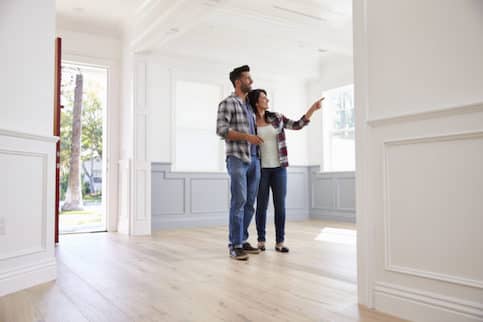As you search for the perfect place to call home, you might visit more than a few houses. Like most interactions, there are some specific house hunting etiquette rules you should keep in mind during a house viewing.
What Is A House Viewing?
A house viewing is often a one-on-one showing scheduled with your real estate agent. This is different from an open house, during which anyone interested can pop into the house for a look. Instead, during a house viewing, the real estate agent will show you around the house and answer any questions you might have about the property.
What’s Your Goal?
Buy A Home
Discover mortgage options that fit your unique financial needs.

Refinance
Refinance your mortgage to have more money for what matters.
Tap Into Equity
Use your home’s equity and unlock cash to achieve your goals.
Tips For Preparing For A House Viewing
If you schedule a house viewing, it’s a good idea to prepare for the experience. A little bit of preparation can go a long way toward making the house viewing as productive as possible.
Do Your Homework
Start by taking a close look at the home listing on your own or with your real estate agent. Look for potential issues with the house and write down any questions you want to get clarification on during the viewing.
Bring Your Team
If you’re serious about buying the house, make sure that every decision maker is there. Otherwise, you might have to schedule a second showing to give your partner a closer look at the property. It’s more efficient if everyone can attend the viewing together.
Also, it’s a good idea to leave distractions behind. For example, you might decide to leave your pets or children at home to focus on the details of the house you’re considering purchasing.
Bring Your Documents
Before looking at a house, make sure to get your documents in order. If possible, bring a copy of the home listing and your mortgage preapproval letter.
Also, make sure you have a clear understanding of how much you can afford to spend before stepping foot in a potential property. Otherwise, you might be pushed back to square one if your lender is unwilling to lend you enough to purchase that particular house.
Take Notes And Pictures
It can be helpful to bring a way to take notes to jot down anything you have questions about during the home tour. For example, you might want to know when the water heater was last replaced or if the fence belongs to the property or their neighbors.
Also, don’t hesitate to take pictures along the way. You could bring your smartphone to handle everything. Or you might opt for a physical notepad and Polaroid camera. Find a system that works for you.
Ready To Become A Homeowner?
Get matched with a lender that can help you find the right mortgage.
House Viewing Etiquette
It’s useful to make a good impression on the real estate agent or homeowner, especially if you are in a hot seller’s market.
Stick to the following house showing etiquette guidelines to make a good impression.
Arrive On Time
Start off on the right foot with the seller or listing broker by arriving on time. After all, everyone’s time is important. If you arrive late, you signal that your time might be more valuable than the agent’s or the seller’s. It’s not a good look for anyone.
Luxury residential real estate professional Sheryl Simon, of Benoit Mizner Simon & Co., advises to show up on time no matter whom you’re meeting with. “Brokers report back to the seller, especially if there is a bid on the home,” says Simon. “You want to present yourself in a very positive light, remembering that it’s the job of the listing broker to help pick a great buyer that will get to the closing table.”
Treat The Home With Respect
Try to remember that a house viewing involves stepping into someone else’s home, and it might one day be your home. With that in mind, it’s important to treat the house with respect.
Below are some simple things that signal respect for the home:
- Take your shoes off, if appropriate.
- Refrain from using the bathroom.
- Don’t open nightstands, hampers or dressers.
- Don’t eat or drink during the viewing.
In other words, try to treat the home with the same respect you’d hope that someone else would have for your home. It’s worth noting that many of these guidelines apply to open house etiquette too.
Inspect With Consideration
As a prospective home buyer, you’ll likely be able to inspect most parts of the house. However, there are some areas of the home that might be off-limits to potential buyers. For example, dresser drawers, closed closets and medicine cabinets are often considered unacceptable to open.
If you want to see the inside of something, like a closed closet or private home office, ask the real estate agent before barging in. In most cases, you’ll be able to look at anything you ask about.
Don’t Start Negotiating
The house showing is not a time to sit down and discuss negotiations. Additionally, it’s not the time to pick out every flaw in the house. If you start pointing out everything that’s wrong, the seller might decide that you won’t make it through the inspection process.
Instead of diving headlong into the negotiations, wait until you are safely in your vehicle to start sharing your opinions. Otherwise, the listing agent might report your comments back to the seller, which could paint you in a bad light if you launch into a monologue about everything you found wrong about the house.
If you decide to make an offer, there will be plenty of time and space to negotiate for a better price. Don’t worry about starting off the negotiations before you’ve had time to review your notes. It’s helpful to carefully review all of the information to start out your negotiations on the right note. But that can be difficult to do on the spot during a house viewing.
Take The First Step To Buying A Home
Find a lender that will work with your unique financial situation.
Be Prepared To Ask Questions
Most buyers have questions about the home they might potentially spend hundreds of thousands of dollars on. Buying a home is the biggest purchase that most of us make, so it’s perfectly normal to ask questions.
For most, it’s a good idea to come prepared with a list of questions about the property. Below are some questions to consider as a starting point:
- Why is the seller moving?
- What is and isn’t included with the property?
- Is the home at risk for fire, flooding or other risks?
- Are there any issues the seller needs to disclose?
- Have there been any recent home improvements or repairs?
- When were the heating, cooling, plumbing and electrical systems last updated?
- What is the average monthly cost of the utility bills?
- Are there any easements or property line issues?
- Are there any liens, judgments or other title concerns?
- How old is the roof?
- Can I test the water pressure?
- How old are the appliances?
- Where can I park? (If relevant)
Of course, you can add any questions you have to the list. Also, don’t hesitate to ask about anything that comes to mind during the home tour.
Ask Questions Politely
It’s expected for you to ask questions. But it’s not a good idea to be rude when asking your questions. If the seller or agent doesn’t know the answer to the question immediately, ask your real estate agent to contact the seller or seller’s agent later for an answer.
Remember, this isn’t an interrogation. Instead, it’s a fact-finding mission about a property you might purchase. If you don’t like the answers to the questions, you might walk away from the property. But it’s never appropriate to be rude.
What To Do After A House Viewing
After a house viewing, try not to decide on the purchase immediately. Instead, give yourself some time to breathe and review your notes. Discuss the viewing with anyone else involved, like your partner. It’s natural to spend some time discussing the advantages and disadvantages of a particular house before either making an offer or ruling out the property.
If you’re on the fence about the property, consider requesting a second viewing. If possible, request the second viewing during a different time of day than the first. You might find new information when you visit at a different time. For example, you might see how the natural light looks different or if you can hear the noise of a nearby construction site.
While it’s tempting to make this decision entirely based on your emotions, it’s always a good idea to consider both the numbers and your feelings. If a property isn’t the right fit for your needs, then it’s okay to move on to the next option.
The Bottom Line
A house viewing is usually one the first big steps to potentially purchasing the property, unless you’re willing to buy a property without a look inside. It’s an undeniably important appointment, especially if you decide to buy.

Sarah Sharkey
Sarah Sharkey is a personal finance writer who enjoys diving into the details to help readers make savvy financial decisions. She’s covered mortgages, money management, insurance, budgeting and more. She lives in Florida with her husband and dog. When she's not writing, she's outside exploring the coast. You can connect with her on LinkedIn.












